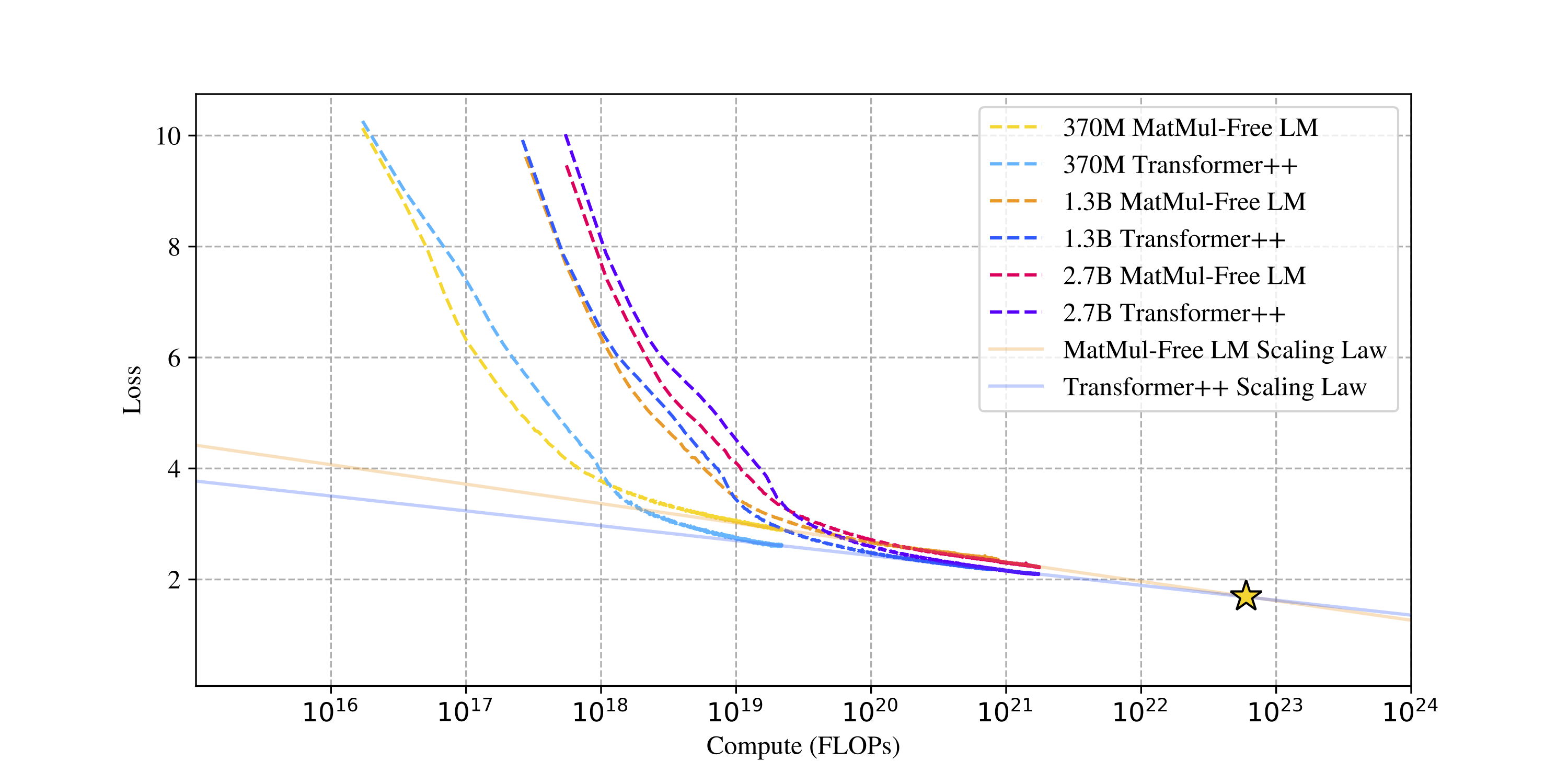This repo is adapted from flash-linear-attention .
The following requirements should be satisfied
pip install -U git+https://github.com/ridgerchu/matmulfreellmAll of the pretrained models currently available can be found in This huggingface collection.
We provide the implementations of models that are compatible with 🤗 Transformers library.
Here's an example of how to initialize a model from the default configs in matmulfreelm:
This is a huggingface-compatible libary that you can use such command to initize the model with huggingface AutoModel:
>>> from mmfreelm.models import HGRNBitConfig
>>> from transformers import AutoModel
>>> config = HGRNBitConfig()
>>> AutoModel.from_config(config)
HGRNBitModel(
(embeddings): Embedding(32000, 2048)
(layers): ModuleList(
(0): HGRNBitBlock(
(attn_norm): RMSNorm(2048, eps=1e-06)
(attn): HGRNBitAttention(
(i_proj): FusedBitLinear(
in_features=2048, out_features=2048, bias=False
(norm): RMSNorm(2048, eps=1e-08)
)
(f_proj): FusedBitLinear(
in_features=2048, out_features=2048, bias=False
(norm): RMSNorm(2048, eps=1e-08)
)
(g_proj): FusedBitLinear(
in_features=2048, out_features=2048, bias=False
(norm): RMSNorm(2048, eps=1e-08)
)
(g_norm): FusedRMSNormSwishGate()
(o_proj): FusedBitLinear(
in_features=2048, out_features=2048, bias=False
(norm): RMSNorm(2048, eps=1e-08)
)
)
(mlp_norm): RMSNorm(2048, eps=1e-06)
(mlp): HGRNBitMLP(
(gate_proj): FusedBitLinear(
in_features=2048, out_features=11264, bias=False
(norm): RMSNorm(2048, eps=1e-08)
)
(down_proj): FusedBitLinear(
in_features=5632, out_features=2048, bias=False
(norm): RMSNorm(5632, eps=1e-08)
)
(act_fn): SiLU()
)
)
)
>>> Upon successfully pretraining a model, it becomes accessible for generating text using the 🤗 text generation APIs.
In the following, we give a generation example in generate.py:
import os
os.environ["TOKENIZERS_PARALLELISM"] = "false"
import mmfreelm
from transformers import AutoModelForCausalLM, AutoTokenizer
#Change here to our open-sourced model
name = ''
tokenizer = AutoTokenizer.from_pretrained(name)
model = AutoModelForCausalLM.from_pretrained(name).cuda().half()
input_prompt = "In a shocking finding, scientist discovered a herd of unicorns living in a remote, "
input_ids = tokenizer(input_prompt, return_tensors="pt").input_ids.cuda()
outputs = model.generate(input_ids, max_length=32, do_sample=True, top_p=0.4, temperature=0.6)
print(tokenizer.batch_decode(outputs, skip_special_tokens=True)[0])If you find this repo useful, please consider citing our works:
@article{zhu2024scalable,
title={Scalable MatMul-free Language Modeling},
author={Zhu, Rui-Jie and Zhang, Yu and Sifferman, Ethan and Sheaves, Tyler and Wang, Yiqiao and Richmond, Dustin and Zhou, Peng and Eshraghian, Jason K},
journal={arXiv preprint arXiv:2406.02528},
year={2024}
}


